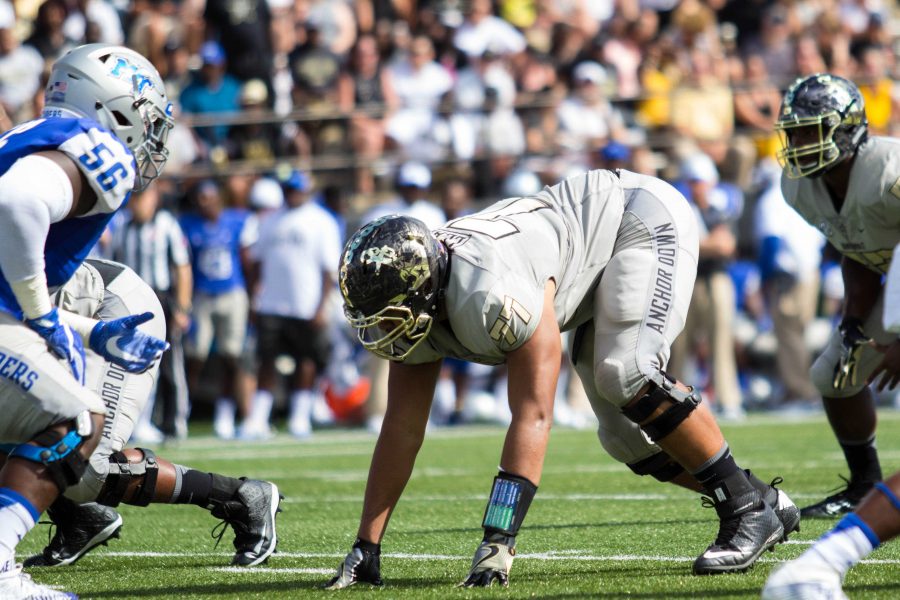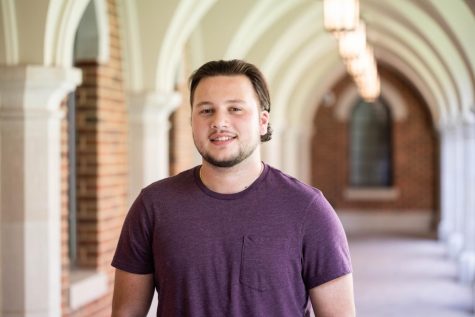So often in sports, the leader of a team is the loudest guy in the room.
A leader is the one who stands up, who preaches, who motivates, and who gives us lines that are immortalized in history. But every so often, sports open our eyes to the notion that you don’t have to be loud to lead. The Tim Duncans and Derek Jeters of the world have taught us that sometimes, leaders lead by example, and that example doesn’t need to include a spoken word.
The top scoring defense in all of college football is anchored by one of those leaders. Vanderbilt defensive tackle Nifae Lealao is by no means the loudest voice in the room, but when he steps on the field, he is a force to be reckoned with. The senior has dominated the line of scrimmage for the first three games of the season, constantly drawing double teams and clogging the running game up the middle.
Lealao put up career highs last season in tackles (22), tackles for loss (4.5), and sacks (2.5), and while even those numbers might not jump out on the stat sheet, they don’t need to. Lealao’s presence is felt by offensive lines around the country. He’s savvy enough to apply pressure when blocked by just one man, and taking on double teams is part of what allows his teammates’ relentless pursuit of the ball, particularly behind the line of scrimmage. Credit Lealao for Vanderbilt’s ranking as the top red zone defense last season, as he stymied opposing running games and created a short passing field.
This season, Vanderbilt’s defense has given up a mere 4.3 points per game, and for a unit that lost four starters, that number is extraordinarily low. Lealao, who last year was accompanied on the interior by now Patriots’ starting defensive lineman Adam Butler, has had to shoulder most of the load. He attributes a shift in mentality to the team’s success on defense.
“Whether it was on the field or off the field, I feel like the dynamic of our team has grown in a more mature way,” Lealao told the Vanderbilt Hustler. “If your brother falls, always be there to catch him, and I think everybody has grasped that concept and everybody has trusted the process, and now we’re here at a good spot at the beginning of the season.”
As a senior and three-year starter, Lealao is at the forefront of that brotherhood. He was Derek Mason’s first ever recruit, and the top recruit of Mason’s first class, so it’s no surprise that Lealao is expected to shoulder the load. Just don’t expect any boisterous halftime speeches.
“Leading in silence is something that some of us do well,” says Lealao. “I think I let my actions exemplify my leadership. Being vocal about certain things is just different, and I think for Jay [Woods’s] role, that’s a little better for him to do, for Ralph [Webb] to do, for Trent [Sherfield] to do, and it’s different for me. I think everybody knows that each of us are leading in different ways and that we’re all trying to achieve the same goal at the end of the day.”
If that goal is winning, it seems like this team is doing a pretty good job. The Commodores have already matched their win total from Mason’s first year, showing that this team is a far cry from where they were just three years ago. Lealao remembers those days well.
“There are times that everyone just feels doubt, when you don’t win games and things may not be going so well for you off the field, but I think senior year is your last chance to do everything. I think as a team, as a player personally, that we’re all taking the next step in the right direction, and it feels great.”
Even as his team has risen to the occasion, leading quietly isn’t something that’s foreign to Lealao, not even at Vanderbilt. With every snap and every step he takes, Lealao knows he’s representing a community larger than a team or even a university. He’s representing the entire Polynesian community. Hailing from Pago Pago in American Samoa, Lealao was born from Samoan parents, and even after moving to Sacramento, his Polynesian roots remained grounded.
Those roots were tested when Lealao committed to Vanderbilt, making him the first Polynesian football player in the team’s history. With little Polynesian presence on campus, and none represented in the university’s athletics, Lealao clung to his culture even more.
“Being Samoan is my life,” says Lealao. “There’s really no ifs ands or buts about it. Everything that I say and do is a representation of my family and my culture.”
As far as Polynesian football players go, it’s far from unusual, particularly from American Samoa. In fact, American Samoa has become somewhat of a breeding ground for NFL talent in recent years. Domata Peko, Rey Mauluga, Mike Iupati, and most notably, Troy Polamalu all come from Samoan heritage. Despite the prevalence of so many possible Samoan icons, Lealao says his inspiration to play football came from his father.
Lealao’s father, Nifae Sr., played semi-professional football, paving the way for an illustrious college career for his son. And just as Lealao followed in his father’s footsteps, others have followed in his own. Nashville is a long way from the West Coast – where most Polynesian athletes end up playing their college sports – but in part because of Lealao’s decision to play his college football at Vanderbilt, the university has become home to a new crop of Polynesian talent.
Just two years after Lealao’s commitment, center Sean Auwae-McMoore and defensive lineman Josiah Sa’o signed their letters of intent, and with the addition of Taiana Tolleson, a goalkeeper for the women’s soccer team, the groundwork had been laid. This year, Vanderbilt football has welcomed the presence of three more Polynesians, with the arrivals of Michael Owusu, Feleti Afemui, and Jonah Buchanon. Lealao, the once lone Polynesian student-athlete, has become the mentor of a family that is now seven student-athletes large, and still growing.
“He’s like a big brother to all of us,” Auwae-McMoore says of Lealao. “He’s opened the doorway, showing that Polynesians don’t have to be afraid to come to the East Coast and ball.”
As Lealao takes the field for his final season at Vanderbilt, he carries with him the support and admiration from all the Polynesian student-athletes that look up to him. He has certainly opened a doorway to success, and he is sure to hold that door on his way out. He understands that the legacy he leaves with this program and this community is far from fleeting.
“You’ve got to realize that you’re doing this for more than just yourself, and I think that’s one of the biggest things other than respect and loyalty that our culture is founded upon,” Lealao says. “Our presence is known here now, and I think after I leave, I leave my legacy up to six other student-athletes that I definitely know will help sustain what I’ve built here.”
Lealao has built a foundation at Vanderbilt, and he’s done it his own way. He has never asked for anything, never demanded anything, and never told anyone what to do. He has led by example in the only way he knows how: in silence.



